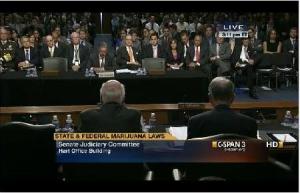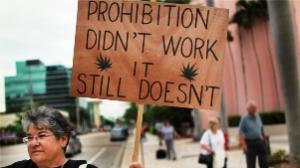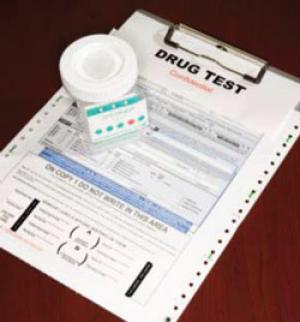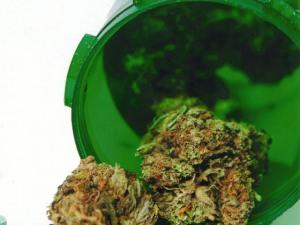2013 saw a historic breakthrough on the international front, as well as evidence that powerful currents are shifting inexorably away from the prohibitionist consensus of the last half-century. But there was also continuity as the drug war, drug production, and the use and trafficking of drugs, all continued apace (although not without innovation).
Last year is receding in the rear view mirror, but before looking forward to the battles of 2014, we take a moment to savor what was, overall, a pretty big year for drug reform on the domestic front.
Regulated dispensaries are coming to Oregon, it's looking increasingly likely that a medical marijuana initiative is coming to Florida, New York's governor sticks a toe in the water, and California's battles continue.
New York Gov. Andrew Cuomo (D) will issue an executive order implementing a limited medical marijuana program. He will make the annoucement during his State of the State speech Wednesday.
Another poll comes in showing a rapid increase in support for marijuana legalization and a solid majority now favoring it, this one from CNN.
Bad cops get sued in Chicago, drugs are missing in Baltimore, an Ohio cop rips off the DARE program, and a Louisiana jailer gets caught smuggling pot and tobacco.
The New Year starts off with a whole bunch of marijuana news, the DEA Cartagena prostitution scandal gets an update, another Republican governor calls for welfare drug testing, and a South Korean comedian gets hammered for toking up. And more.
Today is one of those days when it seems like drug reform is all about marijuana. We have four domestic stories -- all about marijuana policy -- and two international stories -- both about marijuana policy. And then there's the "Breaking Bad" contest winner thinking he's Florida's answer to Walter White.
Marijuana continues to suck all the air out of the room when it comes to drug policy, with news on the legalization, medical, and international fronts. The only non-marijuana-related item we have today is the murder of a confidential informant.
Another poll shows solid majority support for marijuana legalization, Florida's medical marijuana initiative appears to be within reach of qualifying for the ballot (if the state Supreme Court doesn't block it), Sweden's justice minister falls for a pot deaths hoax, and a UN official has a grim warning on Afghanistan. And more.
East Coast governors speak against marijuana legalization, but DC voters may get a chance to have their own voices heard; a new report on Obamacare's implications for drug reform is out; the DEA is reported to have talked to the Sinaloa Cartel; and details of a Mexico City marijuana legalization bill emerge. And more.
What a year in drug reform! 2013 saw a historic breakthrough on the international front, as well as evidence that powerful currents are shifting inexorably away from the prohibitionist consensus of the last half-century. There were also new, innovative approaches to regulating drugs and new, innovative approaches to buying and selling them illegally.
But on the other hand, there were also continuities. Major drug producing regions kept producing drugs, major drug-related conflicts continued, and the global drug war continues to grind on. A bullet-point Top 10 list can't hope to offer a comprehensive review of the year on drugs internationally, but it can illuminate some key events and important trends. With apologies in advance for all those important stories that didn't make the cut, here is Drug War Chronicle top ten global drug policy-related stories of 2013:
#1 Uruguay Legalizes MarijuanaNo question about it; this has to be the top international drug policy story of the year. After a year and a half of laying the groundwork, Uruguayan President Jose Mujica and his ruling Broad Front pushed marijuana legalization through the legislature and Mujica signed the bill into law just before Christmas. Uruguay now becomes the first signatory to the 1961 UN Single Convention on Drugs to break decisively with the treaty and the global prohibition regime on marijuana policy. Uruguay's example is already causing reverberations in Argentina and Chile, and Guatemalan President Otto Perez Molina called it "an important step" that could serve as "a pilot plan" in the regional war against drug trafficking. And that's even before the new law goes into effect in a few weeks.
#2 The Global Prohibition Regime is Under Increasing Attack
In May, the Organization of American States released a report that included an analysis of alternatives to prohibition, including regulation and legalization regimes. The report was an outgrowth of Latin American criticism of the drug war at the Cartagena Summit in 2012. In September, Latin Americans took the call for drug reform to the UN General Assembly, and in a consensus statement agreed to by Chile, Colombia, Costa Rica, Guatemala, Mexico, Paraguay, and others, called on the UN "to reevaluate internationally agreed-upon policies in search of more effective responses to drug trafficking, from a perspective of health, a framework of respect for human rights, and a perspective of harm reduction." And in December, a leaked draft document revealed even broader divisions among member states, with several European nations offering serious criticism of the drug prohibition status quo.
#3 Bolivia Reenters UN Drug Treaty, But Rejects Coca Chewing Ban
The UN 1961 Single Convention on Narcotic Drugs, the legal backbone of global drug prohibition, took a hit in January, when Bolivia successfully rejoined the convention, but only with the reservation that it would ignore the treaty's ban on coca leaf chewing despite the objections of the US and the International Narcotics Control Board. Bolivia had withdrawn from the treaty the year before to protest the inclusion of the ban on coca chewing, a traditional indigenous practice that had gone on for hundreds, if not thousands, of years before Eurocentric treaty negotiators managed to criminalize it internationally under the Single Convention.

Coca Museum, La Paz (Phil Smith, Drug War Chronicle, 2007)
In July, New Zealand took a historic step away from drug prohibition and toward regulation when a new law went into effect to regulate and control new synthetic drugs. The law had breezed through Parliament on a 119-1 vote. Synthetic drug manufacturers who meet safety standards are now licensed and regulated, and their products are available legally at retail outlets. The law is designed to avoid the dangers of driving the trade underground and to end the perpetual game of prohibitionist catch-up played with synthetic drug makers, who, when one drug is criminalized, simply tweak a molecule or two to create a new one.
#5 The Dark Net Emerges as a Drug Marketplace
After quietly lurking in the dark corners of the Internet, the online illicit drug (and other goodies) marketplace Silk Road hit the big time in a big, bad way in October, when its operator, Ross William Ulbrict (AKA the Dread Pirate Roberts) was arrested by the FBI on drug trafficking, money laundering, and computer hacking charges. Silk Road and other "dark net" web sites require an anonymized browser (Tor) that was supposed to keep operators and users safe from prying government eyes, although the Ulbrict and related busts suggest that isn't entirely the case. Other sites, including Sheep Marketplace and Black Market reloaded, sprung up to replace it, but they have had their own problems. In November, Silk Road announced it was back, in Version 2.0. Meanwhile, the saga of the original Silk Road continued at year's end, with Ulbricht suing the federal government for the return of $30 million worth of bitcoins he argues were improperly seized. The battle between governments and Internet black marketers is doubtlessly continuing, even if most of us don't know about it until after the fact.
#6 Mexico: New President, Same Old Drug War
The wave of prohibition-related violence plaguing Mexico didn't garner the media attention last year that it did in 2012, a presidential election year in both the US and Mexico, but it continued nonetheless under incoming Mexican President Enrique Pena Nieto, who took office in December 2012. According to Milenio's annual survey of drug war deaths, there were more than 10,000 killed last year. That is down from over 12,000 the year before, but still unconscionably high. Pena Nieto came into office vowing to reform the government's approach, but so far the changes have been mainly rhetorical, with the government shifting emphasis from going after top capos to increasing public safety and security. And the top leaders of the Sinaloa cartel, Mexico's most powerful, remain apparently untouchable.

Afghan anti-drug art (Phil Smith, Drug War Chronicle, 2005)
Thirteen years after the Taliban virtually eliminated opium production in a bid to win foreign favor and US funding, and 12 years after the US invaded Afghanistan to drive the Taliban from power, Afghan opium production was at its highest level ever, about 5,500 metric tons, accounting for around 90% of global illicit production. According to the UN Office on Drugs and Crime's 2013 Afghanistan Opium Survey, opium production increased a whopping 49% over 2012, while the area under cultivation increased 36%. The previous high was in 2007. US anti-drug policies have been consistently relegated behind US counter-insurgency imperatives during the US and NATO occupation of the country, leaving Afghanistan with little likelihood of significant changes after the bulk of Western forces are scheduled to leave at the end of this year.
#8 Peru Overtakes Colombia to Regain Title as World's Largest Coca Producer
Twenty years ago, Peru produced about 60% of the world's coca crop, from which cocaine is derived. But crop disease and aggressive anti-trafficking efforts in Peru hurt output there even as cultivation blossomed in Colombia, which took first place honors by the turn of the century. But this year, the UN Office on Drugs and Crime reported that Peru was once again back on top. According to the UNODC, Peru had 151,000 acres under cultivation, compared to 125,000 for Colombia. The return to first place comes even as the government of President Ollanta Humala steps up eradication and enforcement efforts and suggests that 2014 could be a conflictive year in the coca valleys of Peru.
#9 Iran Continues to Execute Hundreds of Drug Offenders Each Year
Sharing a 1,300 mile long border with Afghanistan and its booming opium trade, Iran suffers one of the world's highest opiate addiction rates and battles mightily to suppress the cross-border drug trade. One of the grisliest weapons in the mullahs' arsenal is the hangman's noose. In recent years, the Iranians have executed hundreds of drug traffickers each year, and last year was no exception. Final figures are not available, but Iran began the year by executing 21 drug offenders in January alone and ended the year with more than 30 executions in December. It's not clear how many of those were drug offenders because reports from Iran are often sketchy, but it appears safe to say that 2013 was another year where Iran hanged hundreds of drug offenders.
#10 Colombian Peace Negotiations Progress
Forty years ago this year, the leftist guerrillas of the FARC rose up in armed struggle against the Colombian state. Based in the country's rural peasantry, the FARC generated enough wealth from the coca and cocaine trades to finance its insurgency, fighting the Colombian military, backed with US assistance, to a sweaty stalemate. Now, however, weakened by years of offensives by the Colombian military and convinced that the government of President Santos is willing to negotiate in good faith, the FARC has been engaged in a so-far months-long series of talks with government negotiators in Havana. Based as it is in the peasantry, one of the FARC's key concerns is agricultural reform; another is dealing with the coca/cocaine economy. The FARC is calling on the government to initiate alternative development and crop substitution programs, and wants to be involved, and in December, the FARC called for the decriminalization of drug use and coca cultivation. It's too early to tell if the negotiations will lead to an end to the world's longest insurgency, but the progress so far is a positive sign.
back to top
Last year is receding in the rear view mirror, but before looking forward to the battles of 2014, let us take a moment to savor what was, overall, a pretty big year for drug reform on the domestic front. Unsurprisingly, marijuana makes up a lot of the news, but there were also signs that America's decades-long incarceration fever is breaking, and even though the impulse to scapegoat the downtrodden through public benefits drug testing remains strong, it doesn't really seem to be picking up much traction, and the year ended with suspicionless public benefits drug testing slapped down by a federal judge. Here are the highlights of 2013:

October Senate Judiciary Committee hearing on state marijuana legalization
While the truly historic moments in US marijuana legalization -- the November 2012 election victories in Colorado and Washington and the commencement of legal marijuana sales in Colorado on Wednesday -- neatly bracketed 2013, history was being made by the Obama administration as well. The first presidency to deal with states voting to legalize marijuana for adults in direct contravention of federal law did so in a remarkably reasonable fashion: by largely getting out of the way. In August, Deputy Attorney General James Cole issued a three-page memorandum affirming that the US Justice Department would allow the two states to move forward with statewide efforts to license and regulate the adult marijuana market. Cole later reaffirmed the agency's position in testimony before the US Senate, stating, "We will not … seek to preempt state ballot initiatives."
#2 State Officials Don't Try to Block Marijuana Legalization Where Voters Approved It
Kudos are also due to legislators, elected officials, and functionaries in Colorado and Washington, who accepted the voters' choice to legalize marijuana with apparent good faith. The Washington state Liquor Control Board and Colorado legislators both came up with workable ways of implementing the will of the voters, while being careful to also heed the concerns of those worried about problems legalization could bring with it. Colorado's system rolled out this week and Washington's will come in a matter of months.
#3 Public Support for Marijuana Legalization in the US Reaches All-Time Highs
If 2012 was the year public opinion in favor of marijuana legalization reaching the tipping point, 2013 was the year it went over it. An October Gallup Poll had support for legalization a record-breaking 58% nationwide. That was in line with a number of other polls since the 2012 elections that showed support either above or just below 50%, depending on the pollster. The on-going sea change in public opinion has also been apparent in polls showing majority support not just where it might be expected, like California, but also where it isn't, like Louisiana and Texas, both of which reported late year majorities for legalization.

Capital City Care medical marijuana dispensary, Washington, DC
Bills legalizing medical marijuana passed in Illinois and New Hampshire, bringing the number of states that allow it to 20, along with the District of Columbia. Dispensaries opened for the first time in New Jersey, Rhode Island, Vermont, and the District of Columbia. And bills that will allow dispensaries to open this year passed in Nevada and Oregon. About two dozen states saw medical marijuana legislation filed last year; expect a similar level of activity this year.
#5 The Number of State, But Not Federal, Prisoners in America Keeps On Declining
For the third year in a row, the number of people in prison in the US declined, the Justice Department's Bureau of Justice Statistics reported in July. (The figures are actually for year's end 2012, but the report came out in 2013, so here we are.). The figures do not include jail inmates. At the end of 2012, there were 1,571,013 prisoners in America, down 1.7% (or 27,770 inmates) from the previous year. Breaking down the numbers, that means that somewhere north of 330,000 people were serving time for drug crimes in US prisons at the end of last year, down from a record high of nearly half a million at the beginning of the century. The decline is because of shifts in sentencing policies in the states; the federal prison population kept expanding, although at a lower rate than over the past decade.
#6 Momentum for Sentencing Reform Grows in Washington
The clamor to do something about drug sentencing reverberated throughout the nation's capital in 2013. In August, Attorney General Holder announced an administration package of sentencing reforms, some of which could be enacted administratively, such as prosecutors not routinely resorting to mandatory minimum charging decisions, but others of which require congressional action. And while Congress didn't actually pass anything, it laid the groundwork for action next year. Senate Judiciary Chairman Sen. Patrick Leahy (D-VT), an increasingly loud critic of mandatory minimums, allied himself with Sen. Rand Paul (R-KY) to introduce the Justice Safety Valve Act of 2013, and similar legislation has been introduced in the House. In another sign of interest in sentencing reform, 10 members of the House Judiciary Committee formed an "over-criminalization" task force in May. The Senate Judiciary Committee held a hearing on mandatory minimum sentencing in September to whip up support for their legislation and other sentencing reform bills, and the committee held a mark-up session on the bills in December. The stage appears set for real movement this year.
#7 "Defelonization" Emerges as a Sentencing Policy Option for States
Although, over the years, 13 states and the District of Columbia have moved to reduce incarceration burdens by treating simple drug possession offenses as misdemeanors instead felonies -- defelonization -- the idea got renewed impetus in 2013, especially on the West Coast. In California, a bill that would have allowed prosecutors the option of charging felony possession cases passed the legislature, and in Washington state, legislators and activists announced late last year that they would try to move a similar bill there this year. Unfortunately, California Gov. Jerry Brown (D) vetoed the defelonization bill, but as a result of that veto, the San Francisco DA and the San Diego police chief have filed a defelonization initiative. While 2013 was a building year for defelonization efforts, they could well bear fruit this year.
#8 A Tough Year for Public Benefits Drug Testing BillsLegislation seeking to make public benefits beneficiaries pass drug tests continued to popular in Republican-dominated state legislatures in 2013, with bills introduced in at least 30 states, but by year's end, only a handful had actually passed, and all of those were "reasonable suspicion" bills instead of bills requiring mandatory, suspicionless drug testing. Drug testing bills passed in Kansas (welfare, unemployment), North Carolina (welfare, passed over the Republican governor's veto), Michigan (unemployment), and Texas (unemployment). But as the year went on, there was rising criticism of the cost of enforcing such legislation and the small number of actual drug users found in states that had previously passed similar bills, including Minnesota, Oklahoma, and Utah. And the last day of 2013 saw a federal judge throw out Florida's suspicionless welfare drug testing law as unconstitutional. The up side is that that ought to drive a stake through the heart of any more suspicionless drug testing bills; the down side is that legislators elsewhere have already figured that out, which is why all of the 2013 bills that passed were "reasonable suspicion" bills.
#9 Historic Firsts for Hemp
Not only were industrial hemp bills filed in both houses of Congress last year, but for the first time ever, the House passed a hemp production measure. The measure was an amendment to the farm bill, but unfortunately, the entire bill was defeated after Republicans attempted to attach drug testing provisions for food stamp recipients. A later version of the bill passed without the hemp amendment. Still, there is hope that the hemp amendment, which also had Republican support, will reemerge whenever the Senate and House meet in conference committee. Meanwhile, more states took up hemp legislation, with a bill passing Kentucky and another one passing in Colorado (as part of the implementation of Amendment 64). Hemp bills were also filed in California (approved in the state Senate), Missouri, New Jersey, and Vermont (as part of a broader legalization bill). And in November, a Colorado farmer oversaw the first hemp crop harvest since World War II., even though it remains illegal under federal law.
#10 Obama Exercises Clemency Power, Commutes Sentences of Clarence Aaron, Seven Others
Just before year's end, President Obama granted clemency to eight crack cocaine offenders, bringing an early Christmas present to poster boy for drug war sentencing excess Clarence Aaron and seven other crack cocaine offenders. Aaron has served more than 20 years for his peripheral role in a cocaine conspiracy, and the others were serving equally onerous sentences. The commutations were a departure for the Obama administration, which has been the stingiest in recent presidential history when it comes to the pardon power. Before the pre-Christmas commutations, Obama had issued only one commutation, where someone currently serving a sentence is actually released from prison, and 39 pardons of people who had already been released, some of them decades ago.
back to top
Regulated dispensaries are coming to Oregon, it's looking increasingly likely that a medical marijuana initiative is coming to Florida, New York's governor sticks a toe in the water, and California battles continue. Let's get to it:
CaliforniaLast Thursday, a superior court judge upheld Los Angeles' medical marijuana ordinance limiting the number of dispensaries that can operate in the city. Superior Court Judge Randolph Hammock ruled that Proposition D, which was approved by voters in May, does not violate the due process or equal protection rights of dispensary owners being forced out of business.
Last Friday, advocates asked the state Supreme Court to review a ruling that allows cities to ban all marijuana growing within in their boundaries. The court is being asked to review an appeals court decision in Maral v. City of Live Oak allowing the ban on personal patient grows. Advocates acknowledge that the Supreme Court decided in City of Riverside v. Inland Empire Patients Health and Wellness Center, Incthat localities can ban dispensaries, but argue that cultivation for personal medicinal use is specifically protected by statute.
On Tuesday, the Santa Rosa city council eased the rules on dispensaries. The changes, which included elimination of patient caps, expansion of hours of operation, and allowing dispensaries to sell pipes and other devices used to ingest marijuana, were approved by the council unanimously. Dispensaries had labored under a 500-patient cap that only served to lead competitors to open up shop outside the city limits. The number of dispensaries remains capped at two, but now the city manager has discretion to increase that number in the future.
Also on Tuesday, the Long Beach city council approved putting a dispensary sales tax on the ballot. The tax would start at 6% and could increase up to 10%. The measure also includes a tax of $15 to $50 per square foot for grow areas in dispensaries. The measure will go to votes on April 8.
Also on Tuesday, Fresno County supervisors banned all marijuana cultivation in the county's unincorporated areas beginning next month. The move came over the strenuous objections of medical marijuana users. The unanimous vote includes fines of $1,000 per plant and $100 per plant per day for each day the plants remain after being discovered. Fresno becomes the first county to ban all medical marijuana cultivation.
Florida
On Tuesday, medical marijuana initiative backers said they were near to a million signatures. It's starting to look like People United for Medical Marijuana ballot initiative may actually qualify for the ballot. Organizers need just over 683,000 valid signatures by February 1 and now say they will hit the million-signature mark by next week. If organizers succeed in coming up with enough valid signatures, they still have to wait for the state Supreme Court to rule on whether the initiative's ballot title and summary meet legal requirements. It has been challenged by Attorney General Pam Bondi (R).
New York
On Wednesday, Gov. Andrew Cuomo announced he would institute a limited medical marijuana program. The plan would allow a small number of hospitals in the state to recommend medical marijuana, but relies on the cooperation of federal agencies not known for cooperating with efforts to expand medical marijuana -- the DEA, the FDA, and NIDA. Advocates complained that Cuomo did not call for the passage of comprehensive legislation, which is pending in Albany.
Oregon
On Tuesday, state officials said draft dispensary rules would be posted within a week. The rules, which will be the basis of a statewide dispensary regulations system approved by the legislature, will next undergo public hearings and could be revised before being finalized. In the meantime, dispensary operators can seek temporary operating licenses under the draft rules beginning March 3.
[For extensive information about the medical marijuana debate, presented in a neutral format, visit MedicalMarijuana.ProCon.org.]
back to top
New York Gov. Andrew Cuomo (D) will use his State of the State address Wednesday to announce he will sign an executive order to allow the limited use of marijuana, the New York Times reported Saturday. The move comes as the state legislature is set to debate pending medical marijuana legislation in Albany.

Andrew Cuomo
The executive order will cite a 1980 law that allows for the use of controlled substances to treat serious illnesses. The narrowly-tailored program will allow only 20 hospitals statewide to provide marijuana to patients suffering from a short list of specified conditions. The Department of Health, in consultation with experts, will be charged with drafting regulations for the program.
Under that 1980 law, a little-known bit of New York medical marijuana history occurred. The state Department of Health study conducted a large scale clinical trial using NIDA-supplied marijuana cigarettes to study the effectiveness of inhaled marijuana in preventing nausea and vomiting due to chemotherapy. That study found that marijuana was as effective or more effective than standard anti-emetics 93% of the time.
The move is a departure for Gov. Cuomo, who has previously expressed opposition to medical marijuana. The governor's apparent change of heart on the issue could spur the state Senate, which has yet to even hold a hearing on the pending bill, to finally act.
The move is a step in the right direction, but more needs to be done, said advocates.
"We thank the governor for his leadership and for taking action on behalf of some suffering patients in New York," said Gabriel Sayegh, state director for the Drug Policy Alliance. "With the Senate failing to act, patients have been left to suffer. The governor is doing everything he can within his executive power to help alleviate the suffering of some patients, without having to wait on the Senate."
But, Sayegh noted, a 34-year-old law may not be sufficient to address issues around medical marijuana, and that means the legislature isn't off the hook.
"The legislature still needs to act," he said. "Comprehensive medical marijuana legislation has long languished in Albany. The Assembly has on four occasions passed the Compassionate Care Act, but the Senate has failed to take action or even hold a hearing on the issue. The logjam in the Republican-controlled State Senate has made New York the only state in the Northeast without a medical marijuana program -- so New Yorkers continue to suffer while residents in neighboring states can gain much-needed relief. That's not acceptable."
back to top
A CNN/ORC International survey released Monday has a solid majority of Americans supporting the legalization of marijuana. Some 55% agreed that marijuana should be legal, with 44% disagreeing.
CNN called the results "a major turnaround from past decades," citing its own and General Social Surveying polls showing support for legalization at only 16% in 1987, before rising to 26% in 1996 and 34% in 2002. Support has jumped 12 point in just two years; CNN had support at 43% in 2012.
The CNN poll results are similar to an October Gallup Poll that had support for legalization a record-breaking 58% nationwide. That was in line with a number of other polls since the 2012 elections that showed support either above or just below 50%, depending on the pollster. But in another survey released Monday, the conservative Rasmussen poll had support for legalization at only 41%.
"There are big differences on age, region, party ID, and gender, with senior citizens, Republicans, and Southerners the only major demographic groups who still oppose the legal use of pot," said CNN Polling Director Keating Holland.
Regional support was strongest in the Northeast (60%), followed by the West (58%) and the Midwest (57%), with the South trailing at 48%.
Two-thirds of those under 35 supported legalization, but so did nearly as many (64%) in the 35-49 age group. Half of those 50 to 64 believe marijuana should be legal, but that number dropped to 39% for those age 65 and older.
The number of Americans who think marijuana use is immoral has also undergone a seismic shift. In 1987, 70% thought it was immoral; in the CNN poll, the number has been halved to 35%. And the number of Americans who think marijuana is a serious social problem has also declined dramatically, from 65% in 1972 (the year President Nixon declared drugs "public enemy #1") to 19% now.
"Attitudes toward the effects of marijuana and whether it is morally wrong to smoke pot have changed dramatically over time," said Holland. "That also means that marijuana use is just not all that important to Americans any longer."
The CNN poll was conducted by ORC International, from January 3-5, with 1,010 adults nationwide questioned by telephone. The survey's overall sampling error is +/-3%.
back to top
Bad cops get sued in Chicago, drugs are missing in Baltimore, an Ohio cop rips off the DARE program, and a Louisiana jailer gets caught smuggling pot and tobacco. Let's get to it:
In Chicago,
a Chicago-area couple sued a local drug task force on December 28, charging that members of the Lake County Metropolitan Enforcement Group (MEG) illegally detained them without cause and ransacked their vehicle and home for drugs, but, not finding any drugs, instead stole thousands of dollars worth of items, including money orders, which have been cashed by the MEG. MEG has denied stealing the other items, including a flat screen TV.
In Baltimore, drug evidence went missing from the Baltimore Police evidence room last Thursday. The evidence room is on the upper floor of police headquarters in downtown Baltimore. Police would not say what or how much was taken. The department is investigating.
In Amite City, Louisiana, a Tangipahoa Parish jail deputy was arrested Monday on charges he was conspiring to bring drugs into the jail and sell them to inmates. Patrick Collins, 58, went down after the sheriff's office received information that he planned to smuggle drugs in on that day, and he was caught with four separate packages containing marijuana and tobacco. He is charged with one count of malfeasance in office, two counts of introduction of contraband into a penal institution and possession with intent to distribute schedule 1 narcotics. At last report, Collins was still in jail in a neighboring parish.
In Troy, Ohio, a former Troy police officer pleaded guilty December 24 to ripping off the DARE program. Kirt Wright, 41, copped to running up $15,000 in unauthorized charges for his own use on the DARE program credit card. He pleaded guilty to one count of felony theft in office. He's looking at up to three years in prison at sentencing.
back to top
The New Year starts off with a whole bunch of marijuana news, the DEA Cartagena prostitution scandal gets an update, another Republican governor calls for welfare drug testing, and a South Korean comedian gets hammered for toking up. And more. Let's get to it:

South Korean comedian and actress Song In Hwa gets sent to jail for smoking pot. (Facebook)
Colorado Marijuana Stores Open for Business; Sky Doesn't Fall, But Crowds Form. Crowds of would-be customers braved long lines in frigid, snow-blown conditions Wednesday to be able to participate in the historic first day of legal retail marijuana sales to adults in Colorado. The biggest apparent problem was feared supply shortages, leading some retailers to either limit purchases to a quarter-ounce (state law allows purchases of up to an ounce for residents) or raise prices, or both.
Washington State Marijuana Business Applications Top 5,000. As of year's end, state officials have processed more than 5,000 marijuana business applications, the state Liquor Control Board, which is in charge of the process, said Tuesday. There were 1,312 applications for retail outlets, but the state plans to cap their number at 324, so there will be competition. There were also 2,113 applications for cultivation licenses and 1,512 for processing facilities. And there will be more. Although the application window closed December 20, officials are still processing backlogged applications.
New Hampshire House to Vote This Month on Legalizing Marijuana. The New Hampshire House will vote later this month on a bill that would legalize the possession of up to an ounce by adults 21 and over. But even if it passes the House, it faces an uphill battle. Last year, the Senate rejected a bill to decriminalize a quarter-ounce, and Gov. Margaret Hassan (D) opposed even decrim.
Vermont Marijuana Legalization Bill Introduced. State Sen. David Zuckerman (P-Chittenden) has introduced a bill to tax, regulate, and legalize the production, sale, and use of marijuana, but he said he doubted it would pass this year. The state decriminalized possession last year, and Gov. Peter Shumlin (D) has said legalization isn't a priority this year. The Marijuana Policy Project said it would use this year to build a consensus for legalization, with an eye on 2015.
Marijuana Decriminalization Bill Coming Back in Hawaii. Marijuana decriminalization got through the state Senate last year, but got stuck in the House. Proponents will try again this year, Pam Lichty of the Drug Policy Forum of Hawaii told local media.
Medical Marijuana
Illinois Medical Marijuana Law Goes Into Effect. Illinois' medical marijuana law went into effect on New Year's Day. Sort of. Patients aren't protected until they have signed up with a state registry, which will not be open until the spring at the earliest, and regulatory agencies are going to spend the next four months establishing rules and regulations for cultivation and distribution. Cultivation applications might be accepted by the fall. In the meantime, the state has created the Medical Marijuana Pilot Program web site, which will have updates and information on the state's progress.
Washington State Wants Medical Marijuana Businesses to Pay Taxes. The state Department of Revenue said Tuesday it will send letters to several hundred medical marijuana businesses informing them that they need to be registered and paying taxes. The department is giving the businesses until January 24 to comply. Some medical marijuana businesses already pay taxes, but others don't, arguing that medical marijuana should be treated like prescription drugs, which are untaxed.
Drug Testing
Mississippi Governor to Push for Welfare Drug Testing. In an interview with the Associated Press, Mississippi Gov. Phil Bryant (R) said he wants to require drug tests for recipients of the Temporary Assistance to Needy Families (TANF) program. Bryant's comments came just hours after a federal judge threw out Florida's suspicionless welfare drug testing law as unconstitutional and as "reasonable suspicion" welfare drug testing laws in states like Utah and Minnesota have come under fire as costly and unnecessary.
Law Enforcement
Sleazy Details of DEA Cartagena Prostitution Scandal Emerge. A FOIA request from Foreign Policy has resulted in the release of a Justice Department Office of the Inspector General report on the scandal surrounding Secret Service and DEA agents who accompanied President Obama to the Summit of the Americas in Cartagena, Colombia, in April 2012. The report is full of juicy, sleazy detail on agents making dozens of calls to prostitutes on their government-issued cell phones, searching for dates with transvestite prostitutes, and seeking to redefine "sex" as not including paying hookers to masturbate them and "prostitution" as not what they had engaged in by paying hookers for sex acts. The OIG said that latter claim defied "common sense and legal definitions." Click on the link for more.
International
South Korean Comedian Gets Six Months in Jail for Smoking Pot. South Korean comedian Song In Hwa was sentenced to six months in prison last Saturday after she was found guilty of using marijuana on two separate occasions, one of them in a Las Vegas hotel room, the other one with her older sister in an unspecified location. The older sister got hit even harder, getting two years in prison. Both sisters also received additional years of jail time with the remainder of the sentences suspended. "Marijuana use by a celebrity is not a light crime given its bad influence on society, but considering the defense's recognition of the crime, her reflection, and the fact that it was only two times, we gave her a suspended sentence," the court said.
Peru Will Seek to Increase Coca Eradication This Year. Peru has set a target of eradicating 75,000 acres of coca this year, the head of the country's anti-drug agency, DEVIDA, said Wednesday. That's up from about 58,000 acres actually eradicated last year. Peru has surpassed Colombia as the world's number one coca and cocaine producer, and the government of President Ollanta Humala has taken an increasingly hard line against illicit coca-growing. Eradication efforts will target the Apurimac, Ene, and Mantaro river valleys (VRAEM). The government also plans alternative development and crop substitution schemes for some 75,000 coca-growing families.
TNI Issues Report on Corruption and Drug-Related Violence in Rosario, Argentina. The Transnational Institute has released the first report in its new Briefing Series on Drug Markets and Violence, focusing on the interior Argentine city of Rosario. Illicit drug trafficking and associated violence and corruption went unremarked there until the killing on New Year's Day 2012 of three community activists sparked attention. Click on the link for the full report
Dutch Crackdown on Marijuana Grow Leads to Increased German Cultivation. German police said Thursday that they have seen a large increase in marijuana grows in empty buildings in the northeastern state of Mecklenburg Western-Pomerania. They blame a Dutch crackdown on marijuana growers that has been in place since 2011. Since then, German cops in the state have busted 50 big grows, up from one or two a year before then.
Swansea University Global Drug Policy Observatory Up and Running. The recently created Global Drug Policy Observatory at Britain's Swansea University, whose goal is "promoting evidence and human rights based drug policy through the comprehensive and rigorous reporting, monitoring and analysis of policy developments at national and international levels," is open for business. Check out its new web site by clicking on the link above.
back to top
Today is one of those days when it seems like drug reform is all about marijuana. We have four domestic stories -- all about marijuana policy -- and two international stories--both about marijuana policy. And then there's the "Breaking Bad" contest winner thinking he's Florida's answer to Walter White. Let's get to it:
Marijuana PolicyColorado Marijuana Shops Did a Million Dollars in Business New Year's Day. According to Colorado's 9 News, shops across the state sold more than a million dollars worth of marijuana on the first day of legal sales. The state has estimated that sales could amount to as much as $600 million by year's end, but more shops are going to have to open and business remain brisk to reach that target.
New Mexico Senator Wants Referendum on Marijuana Legalization. State Sen. Gerald Ortiz y Pino (D-Albuquerque) said Thursday he plans to file a bill for a constitutional amendment to legalize marijuana. If approved by the legislature, the measure would go directly to voters in the November election.
New Hampshire House Votes on Marijuana Legalization Next Wednesday. The New Hampshire House will open its 2014 session next Wednesday with a vote on marijuana legalization. The bill before it, House Bill 492, would allow adults to use, possess, and cultivate limited amounts of marijuana with no penalty. The bill would also set up a taxed and regulated market for marijuana production and sale.
Galesburg, Illinois, Ponders Semi-Decriminalization of Marijuana. The Galesburg City Council is considering the approval of a new municipal law relaxing penalties for cannabis possession. Under the proposal, police could either arrest or ticket people caught possessing less than 2.5 grams. The city hopes to raise revenue from fines and redirect law enforcement resources.
Law Enforcement
"Breaking Bad" Contest Winner Busted for Cooking Drugs. In the life imitates art department, a Florida man who won a September contest to watch the series finale of AMC's "Breaking Bad" with the show's cast in Los Angeles has been arrested on charges he had a synthetic marijuana (not meth) lab in his home. Ryan Carroll faces one misdemeanor and two felony charges after his New Year's Eve arrest. "It's such a great show," Carroll said after winning the contest. "I think it's addicting because people can relate to the main character." Can you say foreshadowing?
International
Paraguay President Says No to Marijuana Legalization. Paraguayan President Horacio Cortes isn't taking a cue from neighboring Uruguay, which has legalized marijuana commerce. Cortes told the Associated Press Thursday he opposes legalization because marijuana is an addictive drug and he's seen former classmates "suffer and die" from its effects. Paraguay is the largest marijuana producer in South America, but its low-quality bulk product has the same cachet in South American that Mexican "brick weed" does in North America.
No Marijuana Legalization in the Philippines, Either. A spokesman for Filipino President Benigno Aquino III said Friday that the Philippines is not headed down the path of marijuana legalization. "It is prohibited under the Dangerous Drugs Act. It will remain as such until Congress amends the law," Malacanang Palace deputy spokesman Abigail Valte said during a news briefing. Valte didn't encourage Congress to move in that direction.
back to top
Marijuana continues to suck all the air out of the room when it comes to drug policy, with news on the legalization, medical, and international fronts. The only non-marijuana-related item we have today is the murder of a confidential informant. Let's get to it:
Maryland Senate President Ready to Legalize Marijuana. Maryland Senate President Thomas "Mike" Miller
Jr. said Friday he would support legislation to legalize and tax marijuana. "I favor the legalization and taxation of marijuana, with restrictions," Miller said. "I know where people are going to be a generation or two from now."
Arizona Activists Aim at 2016 Marijuana Legalization Initiative. A drive to put a marijuana legalization on the ballot this year in Arizona is going nowhere. Supporters have gathered only 10,000 of the 259,200 signatures needed by July 3 to qualify for the ballot, and have no money to fund signature gathering, so they are now looking to 2016, when big bucks are more likely to be available.
Rasmussen Low-Ball Poll Has Support for Marijuana Legalization at Only 41%. A new poll from the conservative pollster Rasmussen has support for legalization at only 41%, with 50% opposed. That's down three points from a Rasmussen poll last August. The Rasmussen polls are low end outliers; most other polls show support for legalization at or above 50%.
Medical Marijuana
New York Governor to Move on Medical Marijuana. Gov. Andrew Cuomo (D) will issue an executive order allowing a small number of hospitals in the state to recommend medical marijuana to patients. He is expected to make the formal announcement during his state of the state address Wednesday.
West Virginians Rally for Medical Marijuana As Polls Finds Support. Small numbers of people rallied in Huntington Sunday in support of medical marijuana. They also set up shop over the weekend in front of the Cabell County Courthouse, holding signs and educating passersby. Lawmakers are preparing to reintroduce legislation there, and a new poll finds that 56% of West Viriginians support legalizing medical marijuana, up three points from last year.
Tennessee Legislator Files Medical Marijuana Bill. Rep. Sherry Jones (D-Nashville) has filed a bill that would allow for the use of medical marijuana under limited conditions. The last effort to legalize medical marijuana in Tennessee went nowhere in 2012.
Guam Senator Wants Medical Marijuana Bill Discussed This Month. Sen. Tina Muna Barnes (D-Mangilao) said she is working on amendments to her pending medical marijuana legislation, Bill 215, and wants it discussed this month. If that doesn't happen, the bill should go to the floor sometime in the first quarter of the year, she said.
Law Enforcement
Oregon Snitch Killed. An Oregon man was working as an informant for the Polk County Interagency Narcotics Team (POINT) when he was killed by the people he was trying to set up last month, according to a police affidavit unsealed last Thursday. James Hawkes IV was beaten, shocked with a stun gun, hogtied, and gagged before his disfigured body was left near a cemetery. Two men now face murder charges in his death.
International
Peru Should Consider Marijuana Legalization, Former Drug Head Says. Former head of DEVIDA, the Peruvian drug agency, Ricardo Soberon, has called on the government there to open a dialogue on marijuana legalization. "We must open the debate with Carmen Masias, the President of DEVIDA, and the Peruvian Medical School. Let's open a forum that deals, first and foremost, with the health issues and secondly with safety and the implications of [marijuana] use," Soberon said. "The possibility of removing the criminal element from the cannabis trade -- a drug that is a lot less dangerous than others -- is the answer to 50 years of repeating the same strategies with no results."
New Zealand Cannabis Party Wants Marijuana Treated Like Legal Highs. The Aotearoa Legalize Cannabis Party is calling on the government to amend the Psychoactive Substances Act to include marijuana. The groundbreaking act seeks to deal with new synthetic drugs by regulating them instead of banning them. The party notes that the government has already approved several synthetic cannabinoids, so why not the real thing?
back to top
Another poll shows solid majority support for marijuana legalization, Florida's medical marijuana initiative appears to be within reach of qualifying for the ballot (if the state Supreme Court doesn't block it), Sweden's justice minister falls for a pot deaths hoax, and a UN official has a grim warning on Afghanistan. And more. Let's get to it:

Letting New Hampshire legislators know... (Facebook)
CNN Poll Has Support for Legalization at 55% Nationwide. A new CNN/ORC International poll has support for marijuana legalization at 55% nationwide, up 12 points in two years. The poll also shows a dramatic decline in the number of people who think using marijuana is immoral.
Rally Called as New Hampshire House Votes on Marijuana Legalization Tomorrow. Supporters of House Bill 492, the marijuana legalization bill, are rallying tomorrow morning at the state house as the House prepares to vote on it. Click on the link for more details.
Galesburg, Illinois, Semi-Decriminalization Ordinance Passes. The Galesburg city council Monday night approved an ordinance that gives police the option of ticketing instead of arresting people caught with less than 2.5 grams of marijuana. The city had 68 pot possession arrests last year, costing about $1,100 each to process through the courts.
Medical Marijuana
Florida Initiative Backers Closing in on One Million Signature Mark. It's starting to look like the People United for Medical Marijuana ballot initiative may qualify for the ballot. Organizers need just over 683,000 valid signatures by February 1 and now say they will hit the million-signature mark by next week. If organizers succeed in coming up with enough valid signatures, they still have to wait for the state Supreme Court to rule on whether the initiative's ballot title and summary meet legal requirements. It has been challenged by Attorney General Pam Bondi (R).
New York Governor to Establish Medical Marijuana Program by Executive Action. Gov. Andrew Cuomo (D) will announce at his State of the State address tomorrow that he will use his executive powers to implement a limited medical marijuana program.
Drug Testing
Sisters Sue Chicago Housing Authority over Drug Testing Policies. A pair of sisters who live in a mixed-income development owned by the Chicago Housing Authority have filed suit in federal court over the CHA's policy of requiring suspicionless drug testing of residents. DeAnn and Jessica Steubenfield filed the suit in the fall. It is at least the second lawsuit filed against the CHA over the practice; the ACLU of Illinois filed its own lawsuit earlier. The two cases will get a joint hearing in May. CHA is the only housing authority in the country to require suspicionless drug testing.
Law Enforcement
Washington State Drug Task Force Pays $375,000 in Snitch's Murder. Four law enforcement agencies that make up Washington's Cowlitz-Wahkiakum Narcotics Task Force have agreed to pay the parents of a murdered snitch $375,000 to settle a lawsuit alleging that the cops failed to protect the man after using him to arrest a heroin dealer. Jeremy McLean, 26, agreed to snitch in a bid to avoid charges of his own, and was killed by one of the people he ratted out. The killer is now doing life in prison.
International
Afghanistan Could Become "Fragmented Criminal State," UN Drug Expert Warns. Afghanistan's booming narcotics trade risks splintering the country into a "fragmented criminal state" if the government and its western allies do not step up efforts to tackle opium production, a senior UN official has warned. Opium farming hit a record high this year, and Jean-Luc Lemahieu, outgoing head of the UN Office on Drugs and Crime's Afghanistan office, said production would likely continue to soar before it falls. "If we are not careful, then Afghanistan has a real risk of becoming a fragmented criminal state," he said.
Uruguay Could Become Medical Marijuana Research Hub. Uruguayan presidential spokesman Diego Canepa told the Associated Press Monday that foreign laboratories have told the government they want to set up labs there to study the potential medicinal uses of marijuana. "Uruguay will become a hub for biotechnology," he said. One report said that Canada is discussing the possibility of importing Uruguayan weed for its medical marijuana program.
Swedish Justice Minister Bites on Colorado Marijuana Overdose Hoax. Swedish Justice Minister Beatrice Ask is facing ridicule for posting on her Facebook page a spoof article that claimed 37 people died of marijuana overdoses the day Colorado legalized the weed. She accompanied her post with comments about her zero-tolerance views on drugs. "Stupid and sad," she wrote above the hoax article. "My first bill in the youth wing was called Outfight the Drugs! In this matter I haven't changed opinion at all." After criticism emerged in social media, her press minister tried to explain that she knew the article was fake and was trying to criticize its publisher for joking about a serious matter.
Kyrgyzstan Addiction Doctor, Politician Says Legalize Marijuana. Addiction specialist and former Kyrgyz presidential candidate Jenishbek Nazaraliev is calling for marijuana to be legalized to reduce drug addiction, fight street crime, and increase tax revenues. He is calling on the government to create a pilot program for legal production near Lake Issyk-Kul, where two-thirds of families are already growing marijuana for the black market. But Kyrgyzstan's State Drug Control Service disagrees.
back to top
East Coast governors speak against marijuana legalization, but DC voters may get a chance to have their own voices heard; a new report on Obamacare's implications for drug reform is out; the DEA is reported to have talked to the Sinaloa Cartel; and details of a Mexico City marijuana legalization bill emerge. And more. Let's get to it:
Marijuana PolicyDC Activists to File Marijuana Legalization Initiative This Week.The nation's capital could vote on marijuana legalization this year. Activists there plan to submit a legalization initiative to city officials by week's end. Because of quirks in District law, the initiative will not seek to allow retail marijuana sales -- that would require action by the DC city council -- but would allow adults to possess and consume marijuana and grow up to six plants.
DOJ Will Reportedly Issue Guidance on Marijuana Banking Soon. The Wall Street Journal has reported that the Justice Department will soon issue a memo with guidelines for financial institutions dealing with legal marijuana businesses. Insiders said the current draft document emphasizes that federal enforcement priorities will be directed toward those who use legal marijuana sales as a front for other criminal activity, funnel it across state lines, or sell it as part of a broader drug dealing conspiracy. But how financial institutions are supposed to know which of their marijuana customers are drawing federal interest remains unclear, suggesting that, as it stands, the draft memo will not satisfy banks.
Rhode Island Governor Calls Marijuana Legalization "Premature." Gov. Lincoln Chafee (I) said Tuesday Rhode Island should wait to see how legalization plays out in Colorado and Washington before trying it there. He added that it was premature to consider legalization before seeing how the state's 2013 decriminalization law is working out.
Maryland Governor Opposes Marijuana Legalization. Gov. Martin O'Malley (D) said Wednesday that while he was open to expanding access to medical marijuana, he opposed general legalization. "I'm not much in favor of it," he said. "We've seen what drug addiction has done to the people of our state, to the people of our city."
Oregon Legislature Could Discuss Legalization Next Month. With plans afoot to field a marijuana legalization initiative in Oregon this year, legislators are hinting they may want to take a crack at it first. Rep. Jennifer Williamson (D-Portland) told a local meeting she expects legislators to take up the issue in the session that begins February 3.
Medical Marijuana
Oregon Medical Marijuana Dispensary Rules Due in Days. State officials said Tuesday that draft rules for the state's newly-regulated dispensary industry should be posted within a week. Then will come a series of public hearings before the rules are finalized. In the meantime, dispensaries will be able to operate under temporary rules, with applications accepted beginning March 3.
New York Governor's Medical Marijuana Plan "Unworkable," MPP Says. New York Gov. Andrew Cuomo (D) is expected to announce an executive order allowing limited medical marijuana availability today, but the Marijuana Policy Project called Cuomo's proposal "unworkable," saying it would require the cooperation of the DEA, NIDA, and the FDA, none of which have been amenable to such projects. MPP says the solution is for the legislature to pass pending medical marijuana legalization.
Obamacare and Drug Policy
New DPA/ACLU Issue Brief Discusses Affordable Care Act's Impact on Drug Policy. A new issue brief from the Drug Policy Alliance and the American Civil Liberties Union reviews provisions of the Affordable Care Act relevant to drug policy, as well as how the ACA can help recast the drug policy debate. The brief is Healthcare Not Handcuffs: Putting the Affordable Care Act to Work for Criminal Justice and Drug Policy Reform.
International
DEA Met With Sinaloa Cartel Leaders, Mexican Newspaper Says. Members of the DEA and the Justice Department met secretly with leaders of the Sinaloa Cartel to gain information about rival cartels, the Mexico City newspaper El Universal reported Monday. The meetings took place without the knowledge of Mexican officials, although US authorities on some occasions provided Mexican authorities with information derived from the meetings. The newspaper identified the DEA or Justice Department employees present at the meetings as Steve Fraga, Manuel Castañon, David Herrad and Carlos Mitchem.
CuPIHD Publishes Study of Mexico City Drug Markets. Mexico's Collective for an Integrated Drug Policy (CuPIHD) has published a quantitative and qualitative analysis of Mexico City illicit drug markets, describing the size and characteristics of the drug markets, as well as how drug users perceive and interact with their legal, economic, institutional, and social environments. The English-language version of the study is Drugs DF: The Illegal Drug Markets of Mexico City.
Draft Reveals Details of Mexico City Marijuana Legalization Bill. The Mexico City web site Animal Politico has obtained a draft of a bill being worked on by a team of leftist Party of the Democratic Revolution (PRD) to advance marijuana reform in the federal district. The bill would completely decriminalize the possession of marijuana, make marijuana possession and distribution "zero priority" offenses for law enforcement, and create a system of dispensaries to sell marijuana for therapeutic reasons. The proposed bill would require changes in, or, at least, exemptions from, some existing federal laws.
back to top














